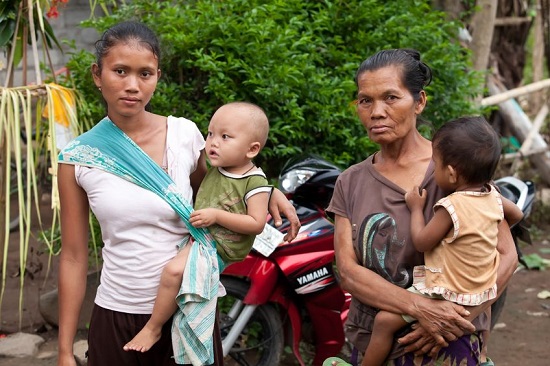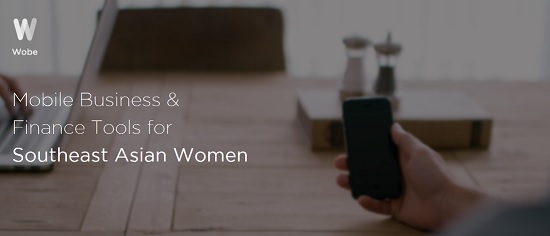Wobe: Entrepreneurial tech for disadvantaged women in SEA
By Gabey Goh April 16, 2015
- At its core, it’s a micro-business app with an e-wallet
- At its heart, it’s about enabling entrepreneurial opportunities for SEA women

TODAY, April 16, marks the soft launch of Wobe (pronounced ‘Woh-Bay’), a small startup with a very big mission: To enable the entrepreneurial will of women in Indonesia.
At its core, Wobe is a micro-business app with an e-wallet, designed to make it easy for anyone with a smartphone and mobile Internet access to start a business in selling prepaid phone airtime, electricity and water payment vouchers, and even bus and train tickets.
It is a business and mission borne out of the time founder Adrianna Tan has spent over the years volunteering at non-profit organisations focused on helping women.
The work she got to do in the field let her see up-close what kind of challenges – and opportunities – there are in Asia. It even inspired her in 2013 to cofound the Gyanada Foundation, which works on creating better opportunities for Indian girls from disadvantaged backgrounds.
“Some of the experiences I had while volunteering stayed with me. A little girl told me once that her father had been beating her mom for years, but the moment her mom started to make US$1 a day selling stuff at the market, he stopped.
“It resonated with me, and I wanted to see if I could use my tech background to build something that could make someone US$5 a day,” she explains in an email interview with Digital News Asia (DNA).
The Singaporean entrepreneur is no stranger to the world of technology, having consulted and worked for well-known startups such as Yelp, Uber, Pozible and mig.me.
She’s also no stranger to entrepreneurship, having founded Pen to Pixel, a small app development outfit run out of Malaysia and Singapore in 2009 after she graduated – funnily enough, with a degree in political science from the Singapore Management University.
“I also spent a year working for Silicon Straits in Myanmar, helping launch ideabox Myanmar, Mobile Monday Yangon, and other community-focused movements.
“It was an exciting time being out there doing startup stuff before there was much connectivity,” she adds.
But her latest venture Wobe is not a case of “technological solutionism,” as Tan doesn’t believe that teaching someone to code is going to lift him or her out of poverty or homelessness – and Indonesia is her starting point.
“I want to create a platform that can give entrepreneurial opportunities to all. Indonesia, for all of its obstacles and problems, is extremely entrepreneurial.
“Everywhere I go, I see immense desire to start businesses and improve lives, no matter how small,” she says.
The ultimate end-goal is to let anyone in South-East Asia with a smartphone and mobile Internet start a business.
For the curious, the name Wobe is cheesy shorthand for ‘Women Benefit,’ which encapsulates the startup’s vision: Build tech that can benefit women in South-East Asia.
“We went with it as it sounded positive and fun in Indonesian, and it also translates well into most other South-East Asian languages,” says Tan.
“Rather than being a social enterprise, we see ourselves as a tech and data startup with social impact – that’s very much focused on building out new business models for the bottom of the pyramid in South-East Asia, starting with Indonesia,” she adds.
Defining the problem

A 2011 article by Direct Action reported that around 6.5 million Indonesian women are illiterate, twice the number of illiterate men, and women’s participation in higher education is lower.
According to the Indonesian Statistics Bureau, in the Jakarta region, women are 88% of the unemployed, with workers, village housewives, young women and urban poor women being the most disadvantaged segments.
Tan (pic, above) says that much like every other part of the world, lower income groups – especially women – do not tend to have access to the capital that they need to start conventional businesses.
“But Indonesia also loves its mobile phones and social media, and I set about to trying to find some way to make it happen. I went into every community I could find, and I was surprised to see that women were already using their phones in innovative ways to make some money for themselves.
“There was a middle-aged lady in a pretty lower-middle class neighbourhood who was using her phone to sell air-tickets to her neighbours, and she had already made US$30,000 in air-ticket sales the past month, making a small commission off each ticket.
“We built Wobe for women like her – women who may not join the formal workforce, but who have plenty of entrepreneurial spirit in them,” she shares.
Getting into the (right) zone
Wobe’s debut takes place during the Demo Day of IdeaBox Arena, a tech business incubator powered by local telco provider Indosat in partnership with Swiss venture firm Mountain Partners and supported by Ooredoo Group, a Qatari telco.
With a focus on early stage startups in telecommunications, media and technology, IdeaBox Arana’s flagship 120-day acceleration programme is intended to help bring startups from ideas to product.
Wobe has the distinction of being the first and only foreign startup to participate in the accelerator to date.
“As a Singaporean, it would have been difficult to just come to Indonesia to do a startup. I was very familiar with Indonesia, but starting up here is completely different,” says Tan.
“Ideabox gave us space, quite literally, to just come here and learn as much as we could about Indonesia. The workspace we work out of, Kejora, which is the home to IdeaBox and other Mountain companies, is one of the hubs for startup and tech activity here in Jakarta,” she explains.
She admits that working independently may have been okay, given that this isn’t her first tech enterprise, but the opportunity to collaborate and work among like-minded people made for a “wonderful” experience.
“Doing this alongside the other startups that were in IdeaBox with us made it easier to move forward and get things done even when everything is falling apart, as it can seem sometimes when you are operating independently.
“At IdeaBox Arena, we will also have the opportunity to showcase our work to a large number of regionally accredited investors, for whom IdeaBox is one of the places to start looking when they start looking at Indonesia,” she adds.
The Wobe team received US$20,000 from Ideabox, in addition to a US$30,000 grant from Ooredoo to make its vision a practical reality.
“Like other acceleration programmes, the equity stake of 20% only kicks in after we reach a certain milestone of US$1 million in valuation,” Tan says.
“We are currently looking to raise US$200,000 to help us grow across Indonesia for the next year and to reach our goal of 500,000 users in 12 months,” she adds.
The team currently numbers nine people, with four manning the business side of things and four on product development, while Tan straddles both worlds in her role as chief executive officer.
“We are still at the very early stage where all of us have to do everything at least once. Our future hires will be largely for community growth and business development roles,” she shares.
The mobile model

An interesting thing to note, says Tan, is that as a micro-business app with an e-wallet, Wobe boasts a self-incentivising system – it lets people make money through the wallet, rather than outright spend it.
“This gives me many interesting business models to consider, but for the time being, our main revenue stream will be transactional.
“Making 30,000 phone credit transactions a day will net us US$60,000 monthly in gross profit,” she shares, adding that market research projects also form another revenue stream for the venture.
With Indonesia being a 98% prepaid mobile market, Wobe’s competitors are the mobile phone kiosk guys who sell vouchers from a scratch card or from their feature phones.
“Buying and selling phone credit is not very sexy here, it’s something that your aunt does. But that’s exactly what we want to do – to let anyone be able to sell phone credits as long as they have a smartphone. We have better margins and better customer support,” says Tan.
“We have a simple user interface and you can sell phone credits to anyone in the country no matter where their SIM card was registered.
“Most of the mobile phone kiosk distribution networks have very geographically-limited phone credit distribution rights. We can have you sell phone credits anywhere in Indonesia, and with a better margin, too,” she declares.
From a technology perspective, Wobe’s solution has three distinct components, with the first being a server-side application that receives all the virtual goods through a supplier's server, and then pushing it to the agent and her customer when an order is made.
The second is a simple mobile application that lets anyone with an Android phone start their own agent business.
The third is a web-based content management system that can push content updates (like articles and surveys), as well as manage users.
“We also have integration with an e-wallet solution. The most complex part was the integration with the supplier of our products, as they mostly work with banks and convenience stores rather than apps like ours.
“We had to design and develop that part ourselves, with some tweaks made to their own systems,” says Tan.
She admits that the toughest challenge was in figuring out how they were going to sell phone credits, vouchers and all of the things which form the core of the product.
“It's not like there's a directory you can go to or a search you can do to find the people who would sell you that. It was three months of utter frustration, and I also became very well-versed with the insanely complex mobile phone and credit distribution system here.
“I honestly think that I might be one of the few people who have gotten so up-close and personal with it, to the point of wanting to just give up because it was too hard. Luckily, my hustling – fuelled by gado-gado [an Indonesian delicacy] – pushed me to find the solutions we needed, and here we have it,” she adds.
Tan notes that Indian companies PayTM.com and Freecharge.in would come closest to what the Wobe team is building in Indonesia, albeit with a different model in play.
Instead of a site or an app that sells phone credits to anyone, Wobe is building out a ‘distributor’ network through its users – low- and middle-income female entrepreneurs who can go out and sell for themselves.
“By creating a self-incentivising ecosystem, we aim to create the largest network of agents here in Indonesia,” says Tan.
“That's the only way to tackle a market that has poor infrastructure, in which only 20% of Indonesians have bank accounts.
“By equipping agents with a sustainable business model, each of them can serve 50 or more people in their communities, and that extends our reach,” she adds.
Next Page: Full steam ahead, and headed for new horizons

